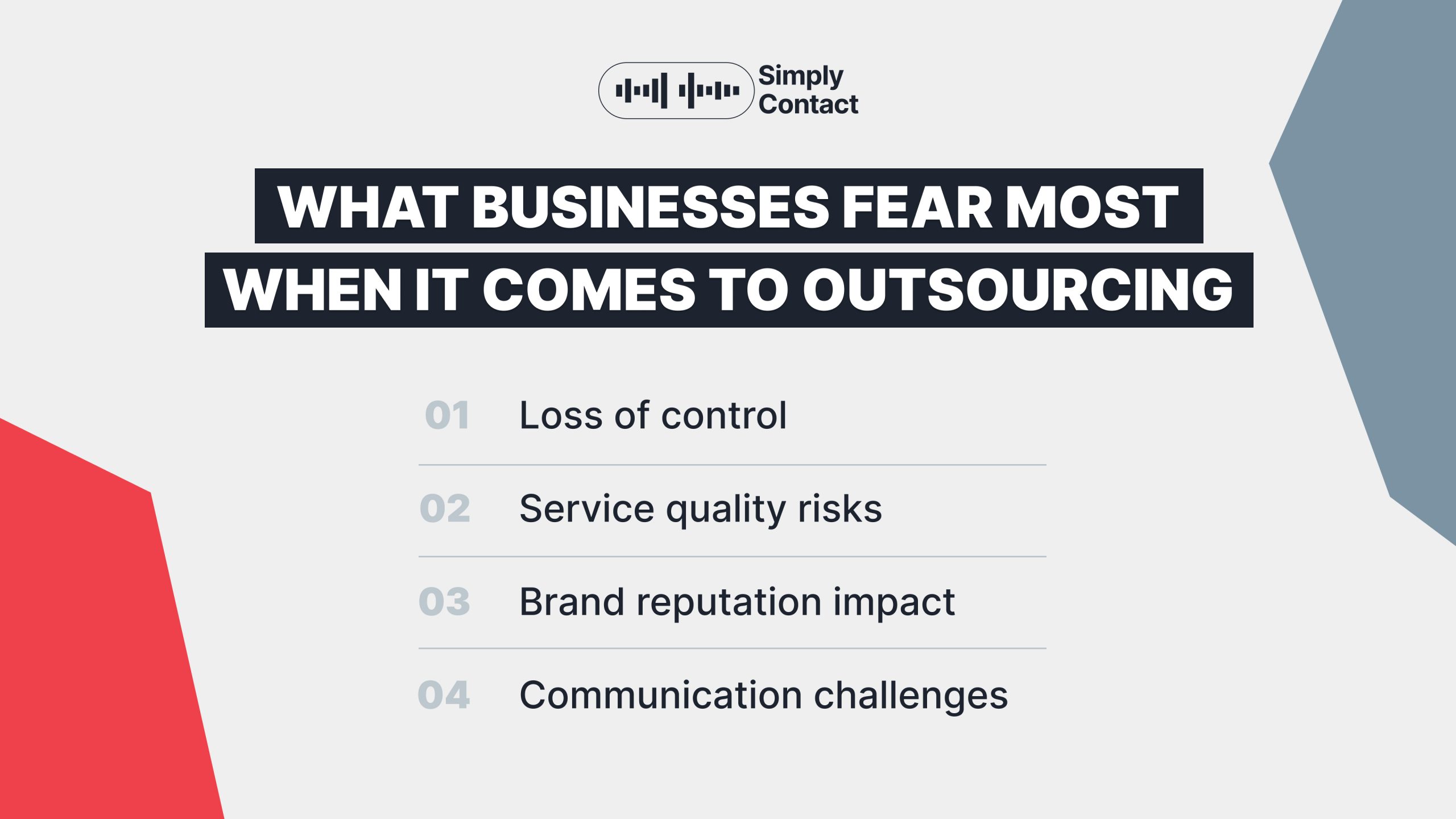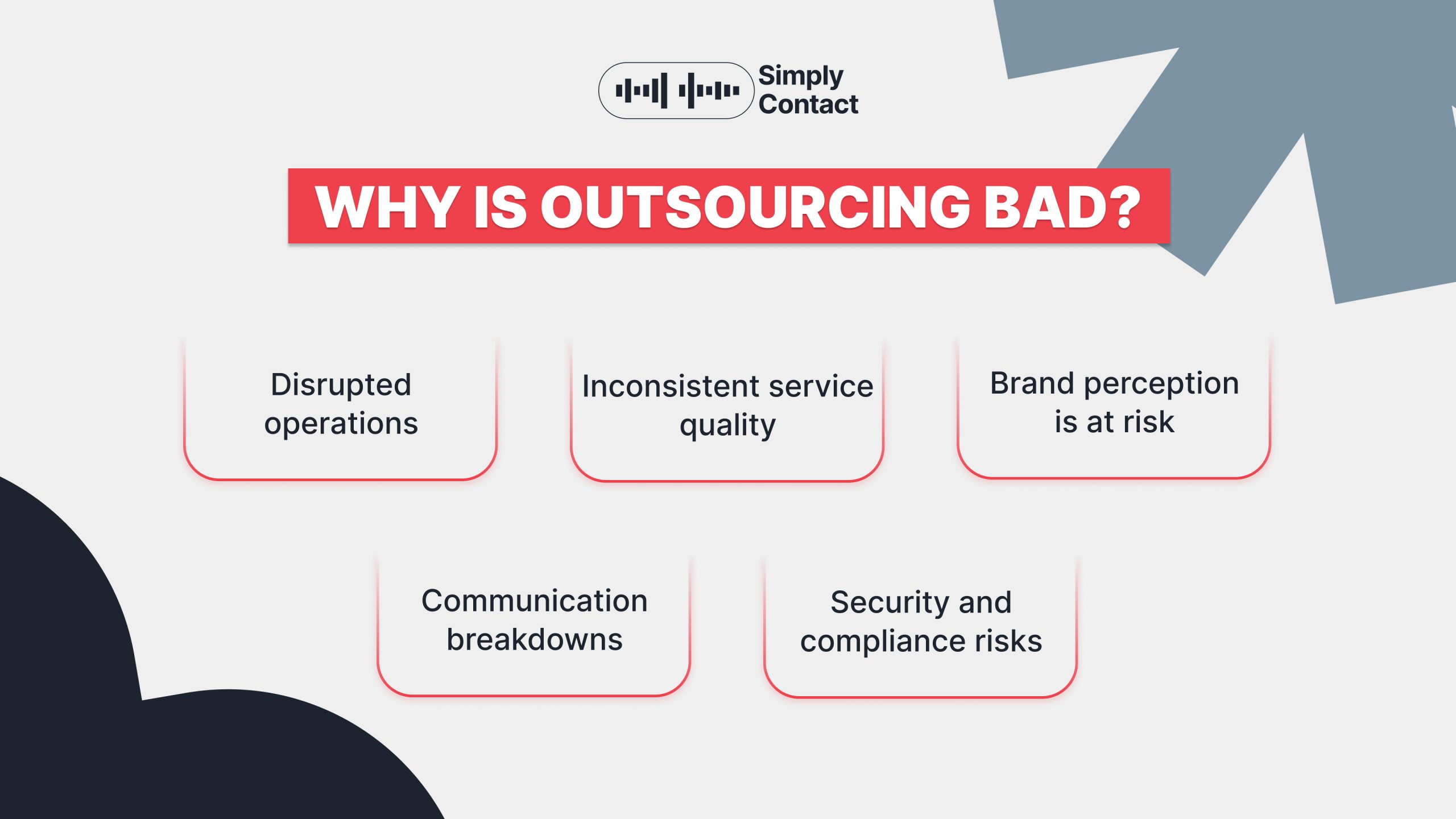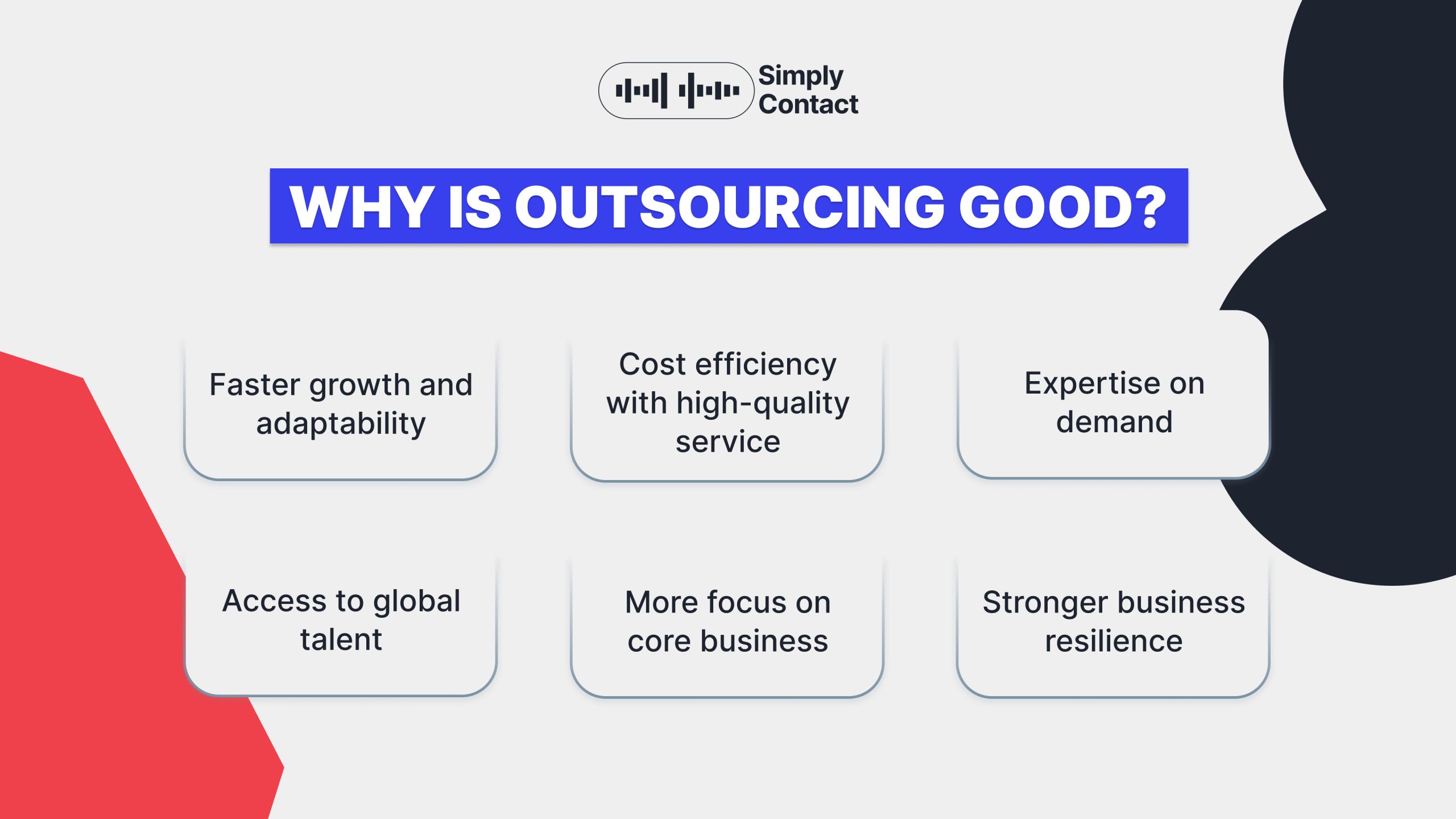Discover how a reliable partner can make all the difference.

Outsourcing is often seen as a cost-cutting tool, but it’s not the only reason for its popularity worldwide. Businesses use outsourcing to streamline operations, access specialized expertise, and stay competitive in a changing market. Yet, for companies with little to no experience in outsourcing, the decision isn’t always straightforward. Will it improve efficiency? How will it affect service quality? What are the risks?
This article breaks down the key challenges and benefits of outsourcing, helping you make an informed choice and finally decide: is outsourcing good or bad?
Types of outsourcing
Before we dive into the advantages and disadvantages of outsourcing, let’s get things straight about the bigger picture, defining what types of outsourcing are there. Outsourcing can take different forms depending on where the service provider is located. Location matters when it comes to challenges, as well as the benefits of using third-party vendors. The three primary types are:
Onshore outsourcing
Choosing providers who operate within the same country as the business. This setup removes communication barriers and cultural differences, but doesn’t offer maximum cost-efficiency. Organizations choose onshore outsourcing when they require full compliance with local laws and quality standards.
Nearshore outsourcing
Selecting bordering countries that operate within the same or adjacent time zones. Organizations benefit from this method because it delivers affordable solutions that preserve both operational communication and cultural understanding. Organizations that need immediate teamwork or want to avoid major time differences tend to select nearshoring. For example, Polish companies frequently choose Ukraine as their outsourcing destination, and UK businesses select Eastern European or Portuguese locations for their nearshoring needs.
Offshore outsourcing
Working with a provider in a distant country. This is the preferred business model for organizations seeking to achieve maximum cost savings. A typical example of offshore outsourcing exists when a U.S. company sends customer support operations to the Philippines. The cost reduction through this approach requires businesses to handle regulatory variations and service quality assessment challenges. The time difference between locations forces organizations to modify their operations through overlapping work hours or advanced collaboration tools.
What businesses fear most when it comes to outsourcing
The practice of outsourcing exists in multiple forms. The choice to outsource remains challenging for organizations that have not previously used this practice. The potential cost reductions and operational improvements of outsourcing face skepticism from businesses because of various concerns. Let’s explore what they are.
Loss of control
The process of outsourcing requires more than task delegation because it involves giving away complete control of execution, decision-making, and quality management to an external team. Will the outsourced team uphold the company’s standards? Will they make the right calls when it matters most? Businesses fear that even a slight misalignment can tarnish a carefully built reputation.
Service quality risks
The main issue with outsourcing is that an external partner could fail to match the quality standards that an internal team would maintain. The quality of work suffers because of variations between training programs, company cultures, and performance targets. The selection of vendors, along with performance metric creation and ongoing monitoring, serves as a critical process to sustain quality standards. Organizations tend to keep complex and high-touch customer interactions in-house because they need to preserve direct oversight of these processes.
Brand reputation impact
The brand experience that customers have is what matters most to them, rather than who provides the service. The quality of outsourced support that is slow, unhelpful, or inconsistent will harm customer trust and loyalty. The situation becomes most critical for businesses that base their market leadership on premium service delivery.
Communication challenges
The successful operation of teams becomes challenging because of the differences between languages, cultural backgrounds, and time zone variations. The process becomes less efficient because team members face delayed responses and poor communication channels, and their expectations fail to align with reality.

Why is outsourcing bad?
These concerns are completely valid, especially for businesses new to working with third-party providers. We hear them all the time. Outsourcing can go wrong in many ways, and when it does, the consequences are serious. A single bad experience can be enough to make a business swear off outsourcing forever. But the real problem isn’t outsourcing itself; it’s poor service quality, miscommunication, and weak partnerships. So, what are the most common disadvantages of outsourcing, or rather, outsourcing-related reservations? Let’s break it down.
Disrupted operations
The provider's decisions that differ from business objectives result in deteriorating service quality and negative impacts on customers and internal team coordination problems. The absence of control in industries that require brand consistency leads to severe damage to brand identity.
Inconsistent service quality
The pursuit of maximum cost savings by some outsourcing providers leads them to reduce quality standards. The approach results in unskilled staff members who leave frequently and provide unreliable service delivery. A poor outsourcing decision creates extended response times and unproductive customer interactions, which ultimately damage service quality and destroy customer trust, making recovery difficult.
Brand perception is at risk
The method of support delivery between internal teams and external providers remains invisible to customers. The quality of service delivery determines how customers evaluate their experience. The company bears all responsibility for poor service delivery from an outsourced team, even though the provider maintains no direct accountability. The negative aspects of outsourcing will surpass its advantages in this situation.
Communication breakdowns
The operation of an outsourcing partner in a foreign country creates communication challenges because of language differences, cultural variations, and time zone differences, which can lead to operational delays and misunderstandings. The lack of defined processes, together with inadequate coordination between teams, leads to decreased speed instead of enhanced operational efficiency.
Security and compliance risks
The process of sharing sensitive customer information with outside providers creates multiple potential security threats. The failure of providers to follow security standards leads businesses to experience data breaches and receive regulatory penalties and legal consequences.
The risk of severe penalties and customer distrust becomes most dangerous for businesses operating in healthcare and finance because they must follow strict compliance rules.
The main problem arises from service providers who fail to meet quality standards and show inadequate commitment to their clients, rather than the outsourcing practice itself. The partnership with a company that prioritizes quality and compliance and holds itself accountable mitigates these potential risks. The actual benefits of outsourcing operations become apparent when you work with a provider that maintains high standards of quality, compliance, and accountability.

Why is outsourcing good?
Outsourcing isn’t just a cost-cutting measure—it can also be a powerful growth strategy. Businesses that partner with a reputable BPO provider gain efficiency, flexibility, and access to top-tier expertise without the challenges of hiring, training, and managing large teams. Done right, outsourcing benefits operations and gives companies a competitive edge.
Faster growth and adaptability
Business opportunities don’t wait for hiring cycles. Recruiting and training in-house teams takes time, but outsourcing provides instant access to skilled professionals. Companies can scale operations up or down based on demand, whether handling seasonal spikes, expanding into new markets, or launching new services.
Cost efficiency with high-quality service
One of the most impressive advantages of outsourcing is its ability to deliver the same, if not better, service quality at a reasonable cost. Regional cost advantages and economies of scale mean businesses can optimize budgets without sacrificing expertise. Customer support outsourcing alone, done efficiently, can cut costs by up to 70% while maintaining excellent service standards.
A quick consultation can reveal how cost-effective support solutions work for companies like yours.
Book a call
Expertise on demand
Building in-house capabilities for every function isn’t always practical. Outsourcing connects businesses with specialists who bring industry knowledge, advanced tools, and best practices. Whether it’s help desk services, technical support, social media support services, or compliance-heavy processes, outsourcing ensures businesses have the right expertise without the overhead.
Access to global talent
Organizations that restrict their hiring to one location face competition with other businesses for accessing the same candidate pool, which drives up salary expectations. Outsourcing enables businesses to find diverse, skilled professionals who deliver high-quality services at efficient operational levels, thus resolving talent acquisition challenges. The practice provides outstanding value to organizations that struggle to find suitable candidates within their home country's labor market.
More focus on core business
The management of support functions, including customer service, IT, and payroll operations, requires significant resources that could be allocated to strategic development and innovation and business expansion. Outsourcing operations to experienced providers enables businesses to redirect their resources toward their core differentiators.
The majority of outsourcing companies focus on achieving KPI targets, but we take a proactive approach to support your business objectives. Simply Contact works to understand your business targets and suggests relevant AI customer care solutions that enhance operational efficiency and support your vision.
Stronger business resilience
Businesses that maintain only internal staff face multiple risks. Talent shortages, unexpected demand increases, and operational interruptions can cause delays. Outsourcing creates an automatic backup system that maintains business operations during unpredictable periods.
Businesses continue to choose outsourcing despite its associated risks because it offers flexibility, specialized expertise, and efficient scalability when implemented correctly. The main factor for success does not depend on outsourcing alone. The success of outsourcing depends on selecting an appropriate partner and implementing proper setup procedures. Organizations that implement strategic outsourcing approaches develop stronger operations that maintain high quality and efficiency through flexible adaptation to market changes.

Is outsourcing good or bad for the economy?
Outsourcing helps companies save money and stay competitive by moving jobs to countries with lower costs. This allows companies to take the saved money and invest in new technology, research, or other ventures that can create growth. By paying less for labor, companies are able to sell their product cheaper, and individuals get more money in their pockets that they can spend elsewhere in the economy.
But there are genuine costs to outsourcing that cannot be dismissed. Workers are laid off, and communities are hurt when a factory or call center shuts down. Displaced workers have trouble finding new jobs that come with comparable pay, and some never bounce back economically.
The employment losses can have a ripple effect in regional economies, hurting small businesses and cutting tax revenues. Government policy, including retraining programs and unemployment pay, can soften these adverse effects. Although outsourcing does generate economic advantages in general—of reduced costs, greater business efficiency, and kinds of jobs—the benefits aren't evenly distributed.
The businesses and consumers reap the greatest advantages, but the laid-off workers bear the highest costs. Despite all these severe disadvantages, outsourcing is likely a benefit for the economy as a whole, though at a vast human cost.
Is outsourcing good or bad for an organization?
A company makes outsourcing decisions based on its industrial sector, operational requirements, and future business objectives. Businesses need to evaluate the complete set of advantages and disadvantages of outsourcing before making a decision because cost reduction stands as their primary motivator.
The customer support functions of e-commerce, travel, and fintech businesses are often outsourced to ensure continuous service availability and multilingual support. The operational efficiency of logistics, telecom, and retail businesses depends on outsourcing to optimize their workflows and enhance their service delivery.
However, some industries require a more cautious approach. Luxury brands, for instance, prioritize exclusivity and personalized service, making them less likely to outsource customer interactions. Similarly, businesses handling highly sensitive data, such as financial services or healthcare, must ensure strict compliance with security and regulatory standards before outsourcing.
Michael Vainer, Business Development Expert
A company should make outsourcing decisions according to its particular requirements, risk management capacity, and external partnership management abilities. Strategic execution of outsourcing through nearshoring, offshoring, or blended models leads to long-term value when organizations select the right approach. Organizations that perform detailed vendor assessments, establish precise performance targets, and understand both positive and negative aspects of outsourcing will transform it into a strategic growth and efficiency driver.
How we can help
Since 2013, we've partnered with global leaders to support their operations, handling back-office tasks and a wide range of BPO services with efficiency and care. We understand the challenges businesses face when outsourcing and know that success comes down to the right partnership. With experience, attention to detail, and a commitment to quality, we help companies streamline operations while maintaining control and consistency. For any customer support needs, you’re welcome to reach out to us.
Wondering if outsourcing is the right move? Let us walk you through the numbers. A short consultation can show how leading companies achieve maximum efficiency without cutting corners.
Book a consultation
FAQ
Is outsourcing only for large corporations, or can small businesses benefit too?
Outsourcing works for businesses of all sizes. There’s no standard as to how many agents is right to have. While large corporations may outsource to optimize scale, smaller companies often use it to grow efficiently, access skilled talent, and stay competitive without the overhead of building internal teams from scratch.
How can I make sure outsourcing won’t damage my brand’s reputation?
Choose a provider that understands your brand, not just your KPIs. The right partner will act as an extension of your team, using your tone of voice, matching your quality standards, speaking your required languages fluently (and/or using customer service translation), and proactively offering new initiatives. Transparency and shared values are non-negotiable.
What’s the difference between outsourcing and offshoring?
Outsourcing means handing specific tasks or processes to an external partner. Offshoring refers to moving those tasks to another country. You can outsource locally, nearshore to nearby countries, or offshore to more distant regions, depending on your business's needs: speed, cost-efficiency, or access to talent.
Can I outsource just one part of my operations, or does it have to be all or nothing?
You don’t have to go all in. Many companies start with one function, such as support in a new language, after-hours coverage, or one customer channel, and scale over time based on performance and business needs.
What’s the first step if I’m considering outsourcing but not sure where to start?
The first step is to determine which areas of your operations require most assistance, since high volumes, long response times, and expensive operations indicate potential needs. Research providers through online resources or seek advice from someone who has outsourced before. Talk to potential partners. A reliable provider will ask questions and assist you in establishing objectives before presenting a customized solution.
Thinking about outsourcing customer service? Let's talk.
Discover how a reliable partner can make all the difference.
Get fast answers to any remaining questions
Thank you.
Your request has been sent successfully.
Your request has been sent successfully.






